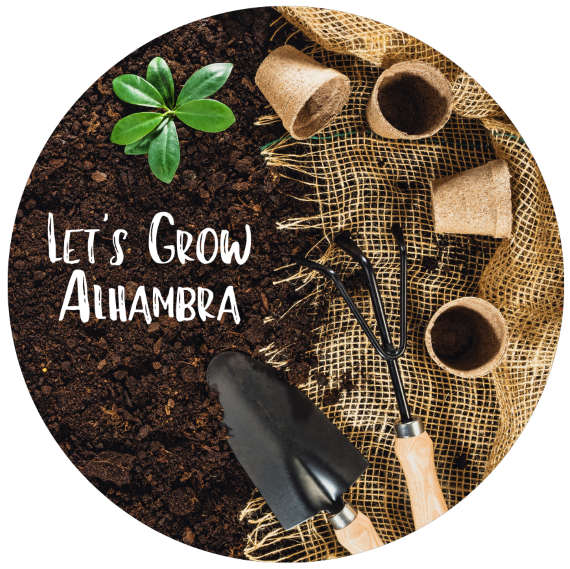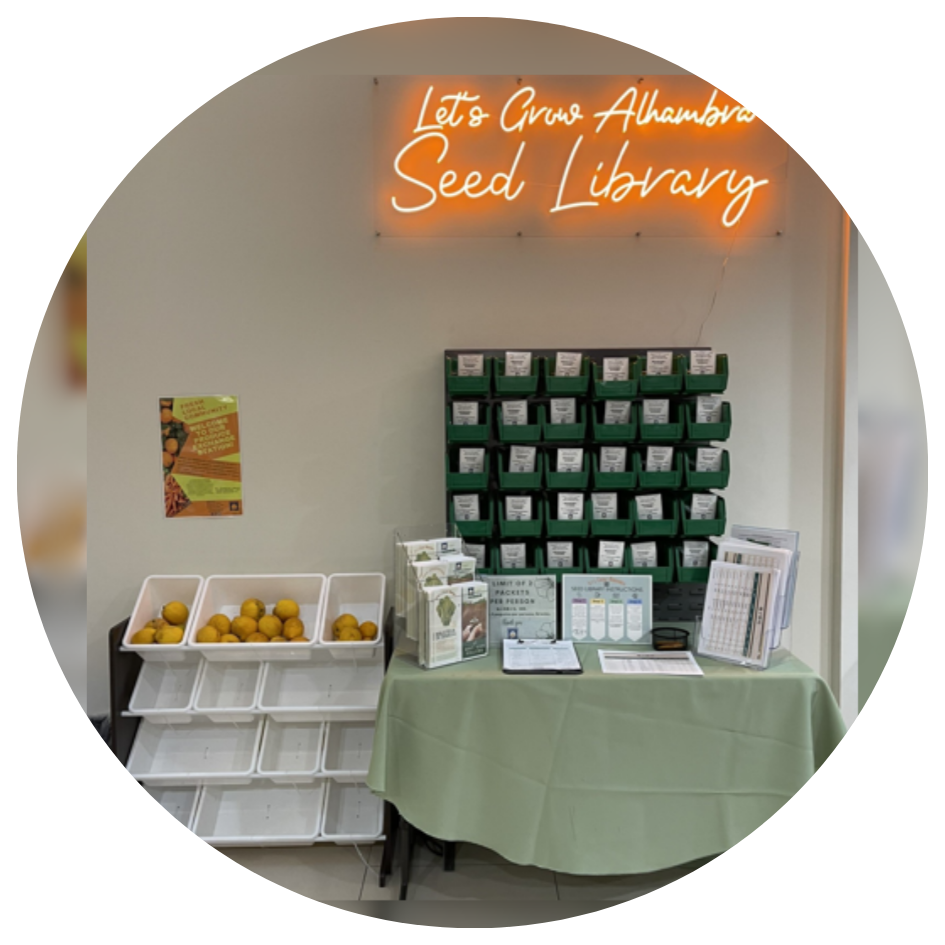
The Alhambra Library's Let's Grow Alhambra program provides the community with a Garden Group, a Produce Exchange Station, a Seed Library, and various programs and events that focus on environmental sustainability, urban gardening, conservation techniques, and how to embrace habits for a healthier and more resilient future.
EVENTS
THE ALHAMBRA LIBRARY GARDEN GROUP
Grow It Yourself. Grow With Your Community
Do you love to garden, or want to learn by doing?
Join the Alhambra Library Garden Group, a 5-month commitment (January – May or July – November) that provides a do-it-yourself gardening experience where community members tend their own garden plots, side by side.
Here's your chance to dive in, get your hands dirty, and learn through hands-on experience and connection. If you're someone who thrives on self-directed learning, this program is perfect for you. Although there are no formal instructors or structured classes, the Garden Group Administration is here to help you access resources and support your gardening efforts. Please email: gardengroup@alhambralibrary.org if you have any questions.
What's Included:
- A personal raised-bed garden plot for the term
- Seeds and starter plants (or bring your own!)
- Opportunities to meet and exchange tips with fellow gardeners in your community
Your Commitment:
- Attend 3 mandatory, in-person meetings throughout the term
- Maintain a do-it-yourself garden plot
- Respect a shared space while growing with care
- Learn from, and share with, a friendly, community-minded group.
Why Join?
- DIY Learning: No classes, just real hands-on gardening!
- Responsibility: It's your garden, your work, your harvest.
- Access to a garden plot: Grow your own vegetables, herbs, or flowers.
- Plant, tend, and harvest: In your own space while exploring gardening techniques at your own pace.
- Community Connection: Grow alongside others, swap stories, share extra seedlings or produce, and build local ties.
- Sustainable Living: Practice self-reliance and eco-conscious habits in a shared, welcoming space that improves your connection to nature.
- Enjoy fresh, homegrown produce!
The Alhambra Library Garden Group program is designed to empower aspiring gardeners to start their own gardens for growing food, herbs, and flowers. The five-month program (January – May or July – November) provides participants with a dedicated plot for planting, tending, and harvesting their choice of approved seeds or starter plants. The initiative supports the Alhambra Library's commitment to promoting sustainable and healthy living in our community and fostering a greater connection to the environment.
Garden Group Spring 2026 Term (January – May): Currently in session.
- Important dates for the Spring 2026 Term:
- Meeting 1: January 5, 2026 11:00am / 6:00pm
- Meeting 2: March 23, 2026 11:00am / 6:00pm
- Meeting 3: May 18, 2026 11:00am / 6:00pm
Garden Group Fall 2026 Term (July – November): Applications open mid-March.

PRODUCE EXCHANGE STATION
Located on the First Floor next to the Seed Library. Where our community comes together to share the bounty of their gardens. Local gardeners are invited to bring their extra fresh fruits, vegetables, and herbs, cultivated with care and passion to share in this lively exchange.
SEED LIBRARY
The Alhambra Library Seed Library offers free fruit, herb, vegetable, and California native flower seeds to Alhambra residents. Visit the Seed Library on the First Floor to choose some seeds to plant in your garden or containers. Limit of two packets per person. We ask that you only take what you'll use so that there are enough seeds for everyone. Our mission, seed types, and growing tips are below.
MISSION
Through the seed library, we hope to:
- Spark interest in learning how to garden and grow food.
- Foster an appreciation and enjoyment of nature, from soil organisms, to plants, to bees, and birds.
- Encourage food self-sufficiency, both personally (growing your own food) as well as in community (harvesting and giving back organically-grown seeds to the community to further a sustainable cycle).
- Help preserve biodiversity, and increase populations of native pollinators (birds, hummingbirds, butterflies, bees, and insects) by planting native flowering plants that provide nectar and pollen, and refuge.
- Increase equity in our community—access to free seeds increases food security and food justice.
- Improve health—growing food in healthy soil can provide more nutrient-rich food than commercial farming.
- Respond to climate change—there’s nothing more local than harvesting from your own yard or balcony.
- Provide education on growing food, healthy soil, saving seeds, and related topics.
- Foster a sense of community among Alhambra’s “urban farmers”.
SEED TYPES (Please note that seed availability will vary)
| Flower: | Fruit: | Herb: | Vegetable: |
| Blue Sage | Cucumber | Arugula | Beet |
| Cornflower | Cucumber (Armenian) | Basil | Broccoli (Calabrese) |
| Cosmos | Pepper (Jalapeño) | Basil (Thai) | Broccoli (Waltham) |
| Daisy (Gloriosa) | Tomato (Beefsteak) | Chamomile (German) | Brussels Sprouts |
| Evening Primrose | Tomato (Brandywine) | Cilantro | Cabbage (Chinese) |
| Gaillardia | Tomato (Cherokee) | Dill | Cabbage (Red) |
| Globe Gilia | Tomato (Red Cherry) | Parsley (Italian) | Carrot (Chanteney) |
| Godetia | Tomato (Roma) | Peppermint | Carrot (Purple) |
| Lavender | Watermelon (Sugar Baby) | Rosemary | Carrot (Nantes) |
| Marigold (African) | Thyme | Cauliflower | |
| Poppy (California Orange) | Chives (Garlic) | ||
| Rose Mallow | Corn (Sweet) | ||
| Salvia (Summer Jewel) | Eggplant | ||
| Sunflower (Mammoth Grey) | Eggplant (Asian) | ||
| Sunflower (Evening Colors) | Kale | ||
| Wildflowers | Kale (Black Magic) | ||
| Lettuce (Batavia) | |||
| Lettuce (Oakleaf) | |||
| Lettuce (Romaine) | |||
| Mexican Sour Gherkin | |||
| Mustard (Red) | |||
| Mustard (Tatsoi) | |||
| Okra | |||
| Onion (Bunching) | |||
| Onion (Tokyo Long White) | |||
| Onion (Yellow) | |||
| Pak Choi Bopak | |||
| Pea (Snow) | |||
| Pea (Sugar Snap) | |||
| Pepper (Anaheim Chile) | |||
| Pepper (Ancho Poblano) | |||
| Popcorn | |||
| Radish (Cherry) | |||
| Radish (Daikon) | |||
| Radish (Watermelon) | |||
| Spinach | |||
| Squash (Butternut) | |||
| Squash (Pink Banana) | |||
| Squash (Summer) | |||
| Swiss Chard (Rainbow) | |||
| Tomatillo |
GROWING TIPS
Basic growing tips and other gardening and composting information are provided below. For further information, the seed packets will include individualized instructions for each seed type.
- A Year of Growing Vegetables
- Composting Basics (CHINESE, SPANISH)
- How to Start Your Garden from a Seed
- Smart Gardening Guide
- Soil and Water Management for Vegetable Gardens (SPANISH)
- Vegetable Garden Basics
Visit the Master Gardeners of LA County website for information sessions, gardening tips, gardening classes, and much more.
For particular questions about your plants, pests, or other garden advice, you can call or email Master Gardeners.
MORE READING
Four-season food gardening by Misilla Dela Llana
The ultimate wildlife habitat garden by Stacy Tornio
The urban garden: 101 ways to grow food and beauty in the city by Kathy Jentz
Bloom: the secrets of growing flowering houseplants year-round by Lisa Eldred Steinkopf
A spoonful of soil helps the world go round by Nydia Needham
Llewellyn's 2023 Herbal Almanac edited by Lauryn Heineman
Initial funding for this project was supported in whole or in part by the U.S. Institute of Museum and Library Services under the provisions of the Library Services and Technology Act, administered in California by the State Librarian.








